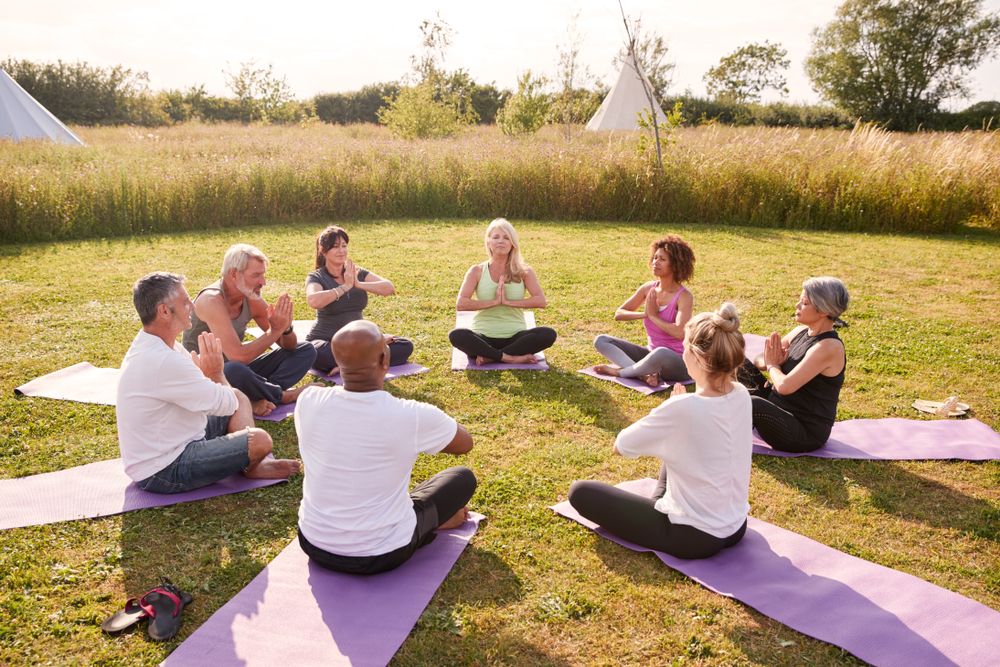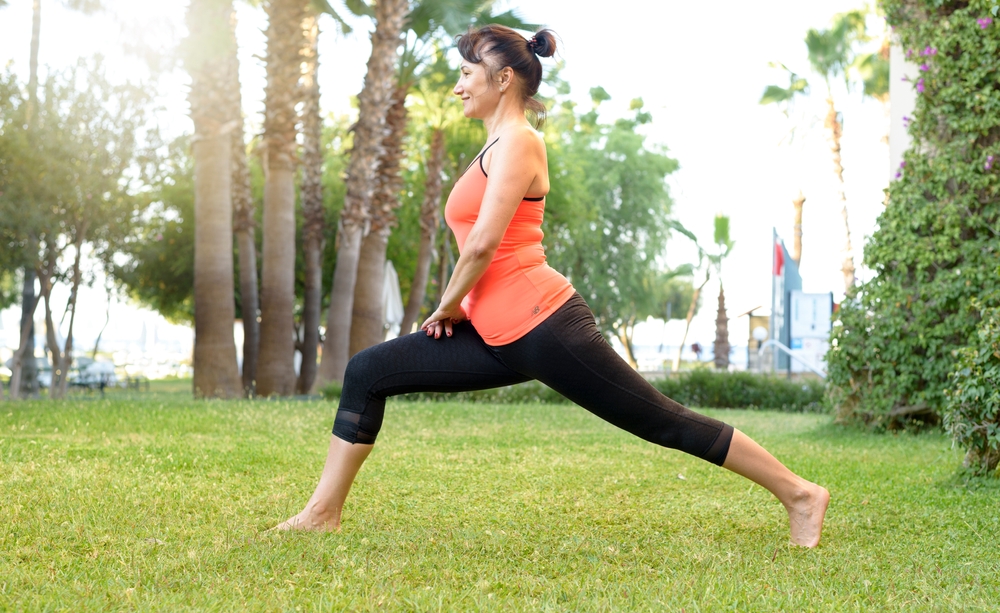DISCLAIMER: Always consult with a healthcare professional before starting any new routines, programs, or nutrition plans to ensure you receive the best medical advice and strategy for your specific individual needs.
Today we answer the question: “Is there a such thing as weight loss retreats for women over 40?”. Let’s dive right in.
Once you hit 40, shedding off pounds can feel like an uphill battle. Reduced metabolism, fluctuations in hormones, and lifestyle-related factors like unhealthy diet, stress, and changes in sleep patterns can make weight loss for women after 40 a little more challenging.
Yet, although difficult, losing weight is not impossible when you turn 40. As long as you embrace some simple lifestyle changes like regular exercise, balanced eating, and healthy coping strategies for stress, you will be able to lose weight and keep fit.
One effective way to achieve all that is a complete environmental overhaul. While small changes can help you trim down, you will be able to achieve even better results when you are away from your familiar environment and the factors that can complicate your weight-loss efforts.
Even better, joining a weight loss retreat program will help you cultivate healthy lifestyle habits, improve your health and fitness level, and stay consistent once at home.
Why Weight Loss for Women Over 40 Is Often Challenging?

There are a number of reasons why losing weight takes longer after 40, from menopause and hormonal changes to a sedentary lifestyle, unhealthy diet, work-related stress, and lack of enough rest and sleep.
Today more than ever, life is fast-paced and full of stress, strain, and worries, and many find it challenging to find room and time for self-care. Not only are we in a rush and turn to ready-to-eat food to save time but stress can cause emotional overeating and loss-of-control eating.
While it helps us fill emotional needs, comfort eating often results in difficulties with weight loss and maintenance.
“Replacement Therapy”

Emotional eaters tend to overeat in response to negative feelings and conditions like loneliness, stress, anger, anxiety, and depression. Many turn to food to combat difficult feelings, fill a void, or when they have no other forms of pleasure.
The problem is that in doing so, we stop learning healthy ways to cope with difficult feelings. Not only this but the feel-good foods we consume are packed with sugar and carbohydrates and low in nutrition, resulting in weight gain and malnutrition.
Inactive Lifestyle

A sedentary lifestyle is hurting health in many ways, from reduced metabolism and chronic inflammation to a higher risk for hypertension, diabetes, cardiovascular disease, anxiety, and depression. A sedentary lifestyle and low levels of physical activity are also associated with being overweight and obese.
In fact, one study shows that middle-aged women with obesity and more severe menopause symptoms are more likely to live a sedentary lifestyle.
Lack of Rest

Work overload and lack of rest are associated with multiple health problems, including type 2 diabetes, coronary artery disease, and stroke.
Research has also found that middle-aged women with a heavy double burden (work and family responsibilities) are more prone to have a high average BMI.
One explanation is that demands from caregiving and work can lead to chronic stress which is linked to the release of cortisol into the bloodstream. Cortisol has been shown to stimulate the body’s carb and fat metabolism, thus increasing appetite and contributing to eating foods that are high in fat and sugar.
Menopause

Many women report gaining weight around menopause, and the main reason is changing hormonal levels. The levels of estradiol, which regulates fat distribution and metabolism, decrease, increasing the risk for weight gain.
Also, lower estrogen levels result in an elevated waist circumference due to visceral fat increase in the midsection. Unlike subcutaneous fat which is found under the skin and places like the buttocks and thighs, visceral fat deposits deep inside the abdomen, surrounding vital organs like the intestines and liver.
The increase in visceral fat is associated with a higher risk for inflammatory diseases, heart disease, diabetes, and insulin resistance (Obesity Action Coalition).
Nutrition

Metabolism and nutritional needs change when the body starts transitioning to menopause. Estrogen levels decrease and slow down metabolism, which is the rate at which your body’s cells convert calories into energy. When metabolism gets slower, you need fewer calories per day to maintain your usual weight.
In addition, thyroid levels decrease, insulin levels rise, and estrogen drops, all of which make you feel hungrier. As your metabolic rate is now slower, you may end up consuming more calories than you burn, resulting in weight gain.
Mindset

Like other women in their 40s, your life likely revolves around your children and other members of your household. This can make it difficult to focus on dieting. And if you have young children, you’re likely spending your after-work time preparing food. On weekends, you think about breakfast, lunch, and dinner. Mac and cheese, fluffy banana pancakes, rich potato dauphinoise, French bread pizza.
Yet, when you hit 40, you can’t eat like this and expect to stay slim. Likewise, telling yourself you just need to cut down on carbs will not help. You need to change your mindset if you want to stay thin.
Stress

If you are like most women in their 40s, you have enough on your plate. You have children to look after, your job is stressful, and you are feeling the financial strain at times. All these stressors and competing demands can cause your levels of cortisol to increase, resulting in a drop in blood sugar and cravings for high-sugar foods.
Sleep

According to a study in Scientific Reports, people between 40 and 50 years get the least amount of sleep. On the wrong side of 40, you have plenty of responsibilities to shoulder both at the workplace and at home.
Besides juggling work commitments, children, and household chores, this is the time when many starts taking care of older members of their families. As well as physical changes that influence sleep, stress is a common reason why people in their 40s get less sleep.
As the body releases cortisol during times of stress and blood sugar drops, this can make us crave sugary foods. Because sugar is absorbed quickly, which makes it a quick source of energy, it’s often the first thing you grab whenever you are feeling stressed.
Tips on Improving Women’s Health

Perimenopause or the menopausal transition is the best time to begin your weight loss journey. When your period stops permanently and estrogen levels drop, it will be more difficult to lose weight and get and stay slim.
So, if you are approaching menopause and weight gain is a concern, this is a good time to make some lifestyle changes that will help you get fit. From forming healthy eating habits and learning how to manage stress to joining fitness and yoga retreats to get back in shape, there are plenty of ways to revive your abandoned New Year’s resolution and reclaim your healthy self.
Fitness Retreats to Regain Control over Your Health

Fitness retreats offer a multitude of benefits, ranging from expert behavioral coaching and motivation and support to nutrition advice, stimulating activities, and getting started with self-care. Joining a fitness retreat is an opportunity to narrow your focus and work on yourself. It can be difficult to stick to your weight loss goals while juggling between housework, family, work commitments, and social events.
Working with a behavioral health team can help you take control of your weight and well-being. They will help you identify the causes of unintentional weight gain, gain control of emotional eating, and adopt healthy lifestyle habits. As unhealthy eating is one of the main culprits of weight gain, you will get expert advice from nutritionists and medical professionals to help you change your relationship with food and enjoy a super-tasty, improved diet.
Lastly, many fitness retreats incorporate games, low-impact exercises, dancing, and fun activities that boost metabolism, burn fat, and prevent weight gain.
Get a Personalized Exercise Plan for Weight Loss

Following a personalized exercise plan can be a great way to shape up and maintain a healthy weight. To begin with, a customized plan is tailored to you, your fitness level, and your goals. Everyone is at different levels and it is important to start where you are, expanding your comfort zone without discomfort and getting too far.
In addition to exercising at your own pace to gradually move into a growth zone, an effective fitness plan is one that is tailored to your goals. Whether you are looking to trim down, get in shape, build endurance, or get a bikini body, your plan should align with your goals while keeping you focused and motivated.
Form New Eating Habits

Improving your eating habits is key to meeting your weight loss goals. That said, women in their 40s should follow some specific recommendations to account for metabolism slowdown.
Perimenopausal women need to adopt healthy habits such as control over emotional eating, limited portion size, and small, frequent, and well-balanced meals. Eating a diverse, balanced diet with plenty of nuts and seeds, whole grains, fruits and vegetables, and lean meat not only helps maintain a healthy weight but can reduce symptoms of menopause.
Get Rid of Accumulated Stress

As stress is one of the main culprits for emotional eating and weight gain, good stress management is essential to weight loss success. Depending on what feels like it will work best for you, you can try yoga or mindfulness practice, keep a journal, find a new hobby, go on vacation, etc.
In essence, practicing self-care is key to taming stress, whether it is getting a massage, reading a book, or taking a long bath.
Recharge with Energy from Nature

Spending time in nature is good for women’s health in a number of ways, from improved sleep and better breathing to reduced irritability and stress. Spending just 20 minutes in nature can help reduce cortisol levels according to a study at Frontiers in Psychology. Flushing cortisol out of your body not only makes you calm down but reduces stress-reduced cravings for high-sugar foods.
Wrapping Up

Weight loss for women after 40 can seem like a challenge due to hormonal changes, metabolism slowing down, and a multitude of responsibilities and competing priorities. In middle age, many are sandwiched between children and elderly parents who need help with care.
Juggling your role as a worker, partner, parent, and caregiver can leave little time for self-care, leading to an inactive lifestyle, unhealthy eating, lack of sleep, and chronic stress. Dealing with the busiest time in your life shifts the focus away from your needs and what is best for you, making it challenging to stay committed to a healthy lifestyle.
While being in your 40s can feel like a pile-on, the perimenopausal transition is just the right time to start taking more responsibility for your health. Transitioning to menopause can be an opportunity for new beginnings and luckily, there are many good ways to get back in shape and improve your health. From forming new eating habits and taming stress to getting a personalized fitness or yoga plan and joining a fitness retreat, there are plenty of opportunities to kickstart your journey to a healthier, happier you.
DISCLAIMER: Always consult with a healthcare professional before starting any new routines, programs, or nutrition plans to ensure you receive the best medical advice and strategy for your specific individual needs.


 By Team THOR
By Team THOR
